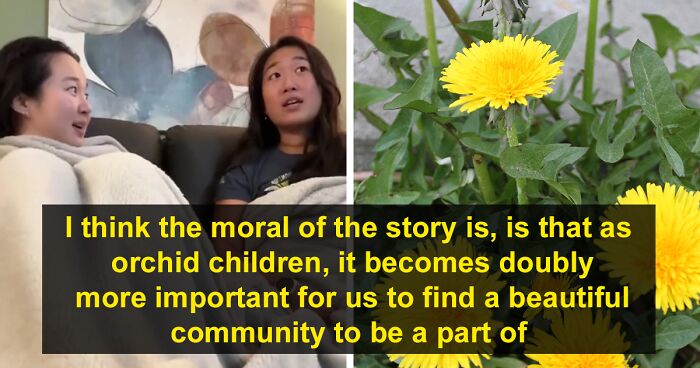
Therapist Explains The Science Behind The ‘Orchid Vs. Dandelion’ Theory, Goes Viral On TikTok
People tend to put “negative” and “positive” labels on things and events in the world. One of the reasons is our human way of thinking, which has to do with comparing things and seeing various oppositions, while at the same time simplifying and making the world understandable. However, this can easily lead to some generalizations, which are not correct and not helpful. One theory that tries to fight the generalization of high sensitivity as a negative-only personality trait is the “orchid versus dandelion” theory. Judy Lee shares her story, as a highly sensitive person growing up in a difficult and unsafe environment, as opposed to her more resilient sibling, which she only later found to be her specific characteristic, but not something that is positive or negative in and of itself.
More info: TikTok
This woman was feeling inferior to her more resilient sibling until she found that being the “orchid” child had its positive side as well
Image credits: theorchidchild
“If you were raised in an unsafe household, and you have a brother or sister, I want you to ask yourself, is one of you guys way more sensitive than the other one?”
“And when I say sensitive, I’m not just talking about emotionally sensitive. I’m also talking about how sensitive one is to sound, to food, to allergies, to the fabric of clothing, and just generally sensitive to the environment. There always seems to be that sibling who does really well and the sibling who doesn’t do as well in an abusive environment. And while I was in grad school, I actually learned that there’s a term for this. Somebody who is highly resilient in an abusive household is called a dandelion child, they can basically thrive in any environment like the flower, the dandelion itself.”
Image credits: theorchidchild
“But orchid children are highly sensitive to their environment so they can actually wilt or wither away in an abusive environment, or thrive and do really well in a positive one.”
“And of course, at first glance, it seems that one is much more preferable than the other. But what was really interesting was a small piece of evidence that demonstrated that if an orchid child is removed from that abusive environment and grows up and is then replaced with a nurturing and nourishing environment, they can actually surpass their dandelion counterparts. I think the moral of the story is that as orchid children, it becomes doubly more important for us to find a beautiful community to be a part of.”
You can watch the original video here:
@theorchidchild why some siblings raised in the same traumatic environment can react differently #orchidchild#traumatok#wellnessjourney#emotionalintelligence#hypnotherapy#dandelionchild#developmentalpsychology#ancestralhealing♬ Lift Me Up – From Black Panther: Wakanda Forever – Music From and Inspired By – Rihanna
The woman grew up in a turbulent family environment, which was sometimes loving, however, often violent
Image credits: judyleeisme
While the woman’s sister handled the challenges comparatively well, she faced various psychological problems
Jude Lee is a hypnotherapist and holistic healer with a master’s degree in psychology. On her TikTok account as well as on her website, she shares her story as an “orchid” child. She explains that she grew up in an immigrant family, with a turbulent, sometimes loving, often violent home environment. While her sister – a dandelion child – dealt with such challenges comparatively well and quickly excelled in academics, friendships, and extracurriculars, she found herself being rebellious and angry, depressed and dissociated. “As an orchid child to my very bulb, tacked on a myriad of psychiatric labels, including PTSD and bipolar disorder.” Which naturally, led to her questioning why she couldn’t handle the difficulties as well as her sibling. After going a long way and getting to the root of the problem, this woman helps other people to deal with similar challenges. The woman’s story, on the one hand, encourages people to recognize the difference in sensitivity among people. On the other hand, it emphasizes the importance of seeing both sides of sensitivity. High sensitivity in people is not supposed to be seen as a weakness, but rather a characteristic that, taken into consideration, can help the highly sensitive people flourish, at the same time benefiting society at large.
Image credits: Mr.TinMD (not the actual photo)
Based on the “orchid versus dandelion” theory, HS children’s development is much more affected by their environment as compared to less sensitive children
Image credits: theorchidchild
“Dandelion” children tend to be less affected by their environment; however, it is a spectrum and not just two groups
According to Elaine and Artur Aron, who defined the term “highly sensitive person”, around 20% of the population, one in five children, is highly sensitive. However, based on the eloquent note in Elaine Aron’s book, highly sensitive people are that minority of people who are the majority of clients, therefore it might be crucial for such people to identify as such and seek the environment that will allow them to use their potential.
Elaine Aron explains that high sensitivity has to do with a person’s temperament; however, when people grow up, it becomes increasingly more difficult to differentiate between nature and nurture in them. The qualities of highly sensitive people include being observant of subtleties and being bothered more than others by high levels of stimulation. They tend to have strong emotional responses and therefore they need more downtime. Highly sensitive people tend to be thoughtful and even though they seem more vulnerable in certain ways, they can thrive in their own way.
One of the most curious parts of the “orchid versus dandelion” theory is the observation that even though highly sensitive people can be harmed more by having a troubled childhood, having a good childhood, they are not more likely to have psychological difficulties as compared to less sensitive people. Even more so, highly sensitive people tend to benefit more from a healthy upbringing as compared to less sensitive people. This is just one of the reasons to not see high sensitivity as a disorder or a disadvantage in itself.
The concept of highly sensitive people, however, is not restricted to psychological health only. Boyce and colleagues were studying the children’s propensity to develop a respiratory illness. They found that these children who appeared more biologically “reactive”, based on such criteria as having high cardiovascular or immune reactivity to stressors, were most likely to develop asthma when raised in an unfavorable environment. However, when raised in a low-risk, supportive environment, these children were the ones who were least likely to develop the illness.
Similarly, based on the study by Knafo, Israel, and Ebstein, “children with the 7 repeat allele of the DRD4 dopamine gene were the least social children in the absence of positive parenting but the most prosocial in the presence of such parenting.” As noted by Eilis Kennedy, the main contribution of the “orchid versus dandelion” theory is the shift from the “dual risk” approach to children with underlying neurobiological sensitivity to understanding the possible outcome as bidirectional for “better or worse”. That is, studies suggest that people might benefit from their high sensitivity when put in a suitable environment.
Image credits: Bob Jenkins (not the actual photo)
Image credits: theorchidchild
Image credits: theorchidchild
Image credits: judyleeisme
Image credits: judyleeisme
People online could relate to the experience that children from the same family environment exhibit different levels of sensitivity
72Kviews
Share on FacebookExplore more of these tags
I wonder if you can be both. Tough enough to hang on in a scary environment but sensitive and intelligent when placed in a safe and loving home.
Yeah, I feel like this is so simplistically explained that it loses all important nuance. My brother and I are both very emotionally (and I think a little bit sensory) sensitive. That's not the difference between our outcomes. I think his depression hit harder earlier, which made him take fewer risks and not step out of his comfort zone, which means he's remained close to my parents while I got away. I also seem to have much higher emotional intelligence. Those things together mean that I have been working on myself and my life and getting treatment for my trauma, and he really hasn't. Not to mention, I'm a woman, and our culture is much more likely to encourage women to get things like therapy, but wants men to just suck it up.
Load More Replies...What if I'm thyme-leaved speedwell? .... /s/ in seriousness, don't reduce us to binaries. We are all on spectrums, bell curves, whatever you want to describe the span of human being-ness as.
In the binary of reading through articles and not reading articles, you fall under not reading. ' “Dandelion” children tend to be less affected by their environment; however, it is a spectrum and not just two groups. '
Load More Replies...I am an orchid child. My older sister is the dandelion. She has trouble trusting new people she doesnt know and old friends or groups she no longer associates with. She thinks I trust too easily. When she went off to college she left because she was so mad at my parents treatment of both of us. I remained, with no support from her for many years. Now I am on the autism spectrum and she is not. I always was they just didn't have a term for it back in the 80s. After I went to college in which I thrived, she invited me to move in with her. It was the best thing she ever did for me. Away from my parents I thrive. Always. But as an orchid I am empathic and kind to others as a result. I love my sister but as a dandelion she is very different as a person. But I respect that. We get along because of this.
I wonder if you can be both. Tough enough to hang on in a scary environment but sensitive and intelligent when placed in a safe and loving home.
Yeah, I feel like this is so simplistically explained that it loses all important nuance. My brother and I are both very emotionally (and I think a little bit sensory) sensitive. That's not the difference between our outcomes. I think his depression hit harder earlier, which made him take fewer risks and not step out of his comfort zone, which means he's remained close to my parents while I got away. I also seem to have much higher emotional intelligence. Those things together mean that I have been working on myself and my life and getting treatment for my trauma, and he really hasn't. Not to mention, I'm a woman, and our culture is much more likely to encourage women to get things like therapy, but wants men to just suck it up.
Load More Replies...What if I'm thyme-leaved speedwell? .... /s/ in seriousness, don't reduce us to binaries. We are all on spectrums, bell curves, whatever you want to describe the span of human being-ness as.
In the binary of reading through articles and not reading articles, you fall under not reading. ' “Dandelion” children tend to be less affected by their environment; however, it is a spectrum and not just two groups. '
Load More Replies...I am an orchid child. My older sister is the dandelion. She has trouble trusting new people she doesnt know and old friends or groups she no longer associates with. She thinks I trust too easily. When she went off to college she left because she was so mad at my parents treatment of both of us. I remained, with no support from her for many years. Now I am on the autism spectrum and she is not. I always was they just didn't have a term for it back in the 80s. After I went to college in which I thrived, she invited me to move in with her. It was the best thing she ever did for me. Away from my parents I thrive. Always. But as an orchid I am empathic and kind to others as a result. I love my sister but as a dandelion she is very different as a person. But I respect that. We get along because of this.

 Dark Mode
Dark Mode 

 No fees, cancel anytime
No fees, cancel anytime 



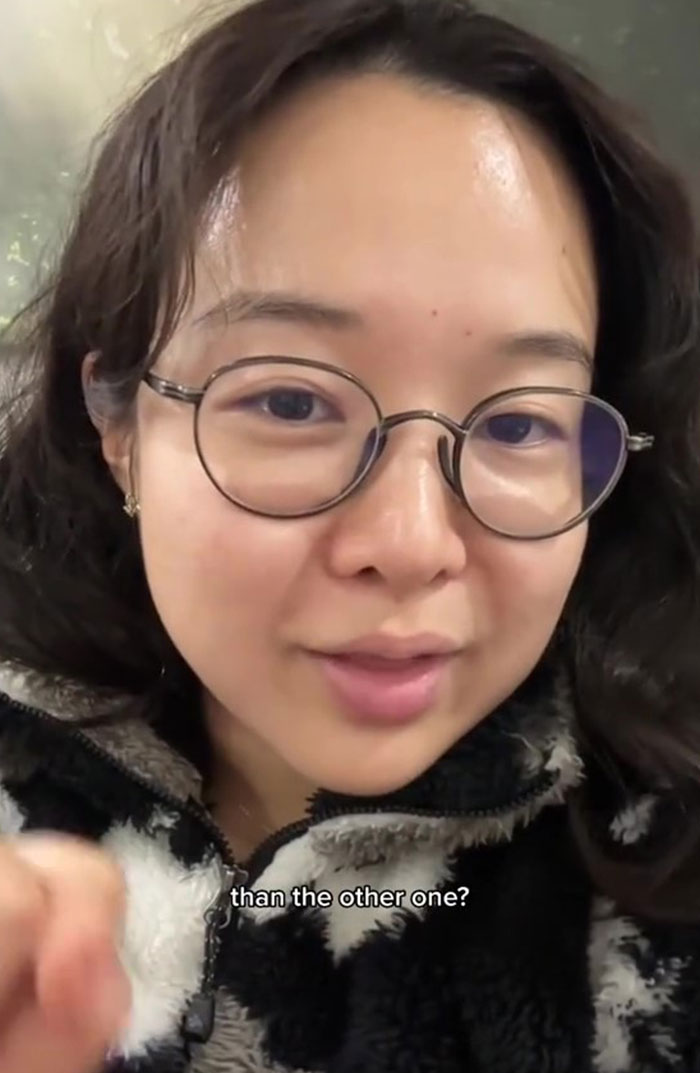

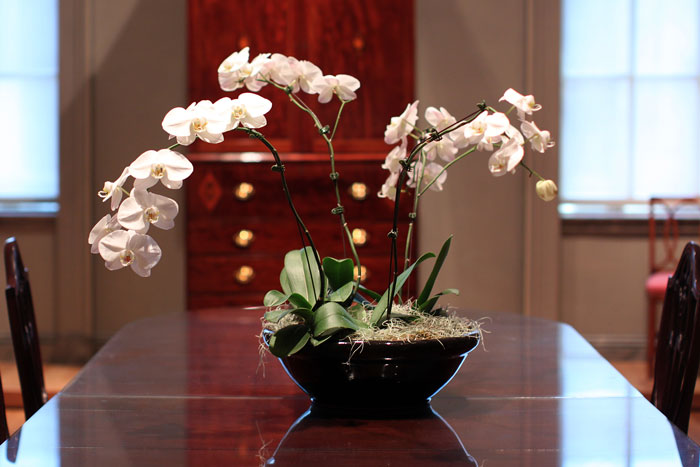

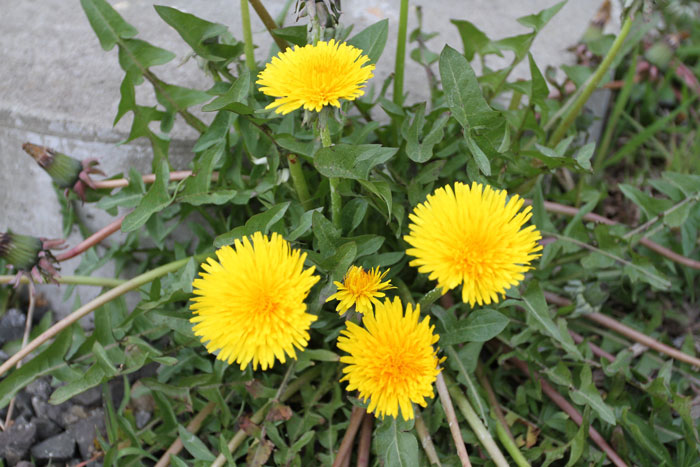
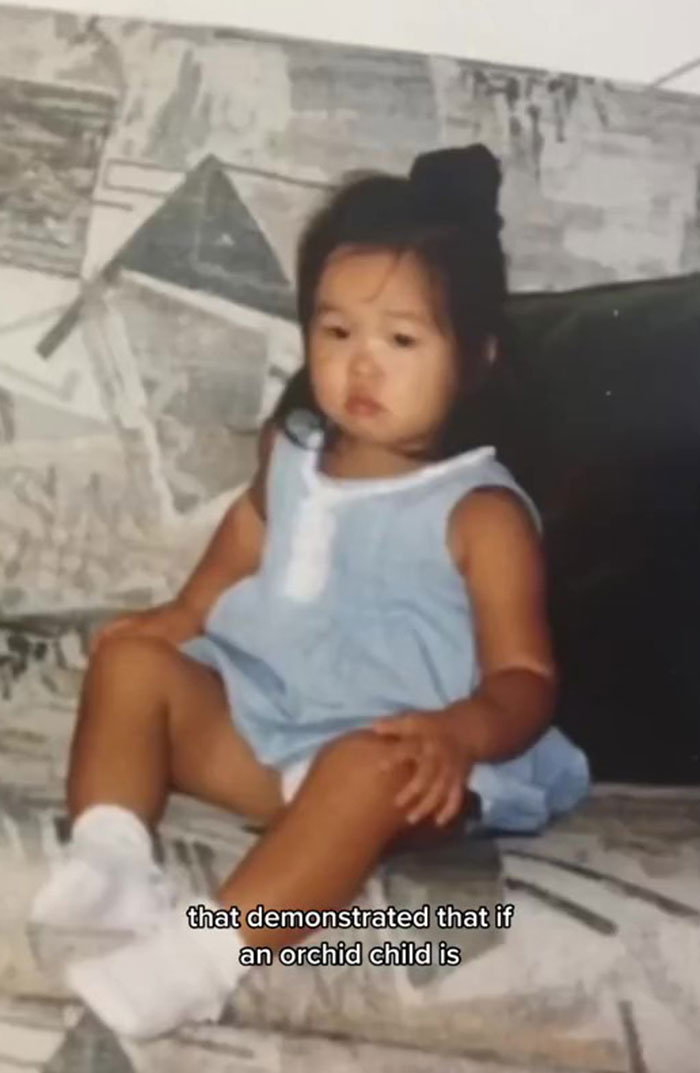
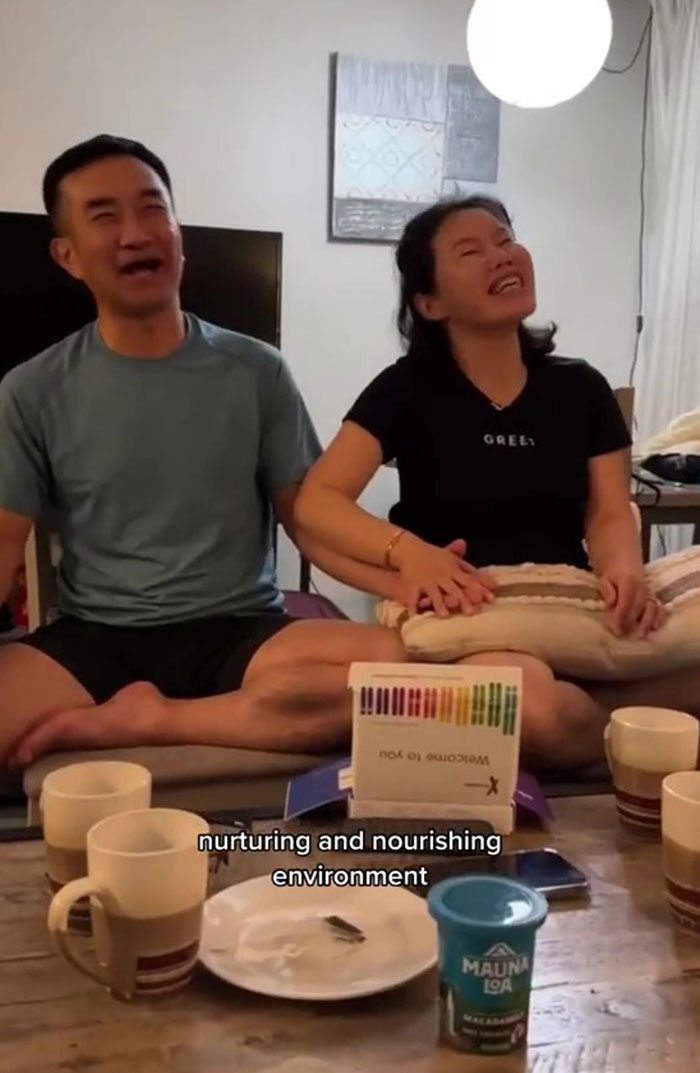
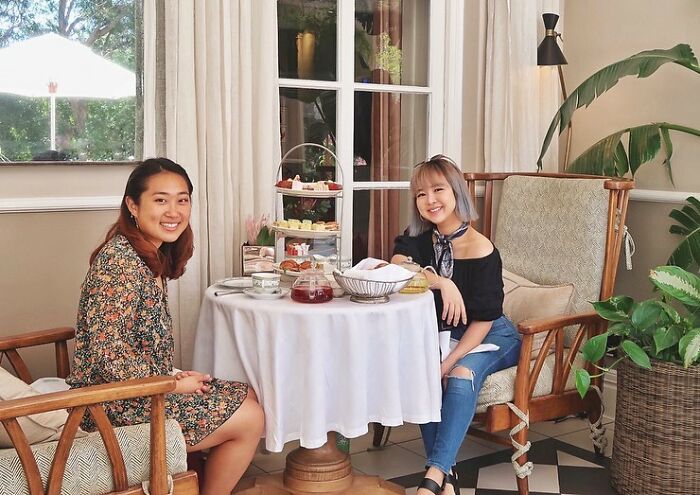









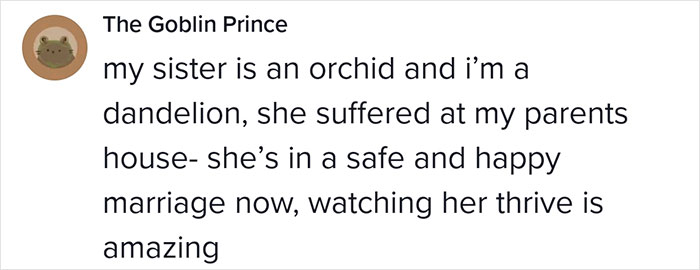
































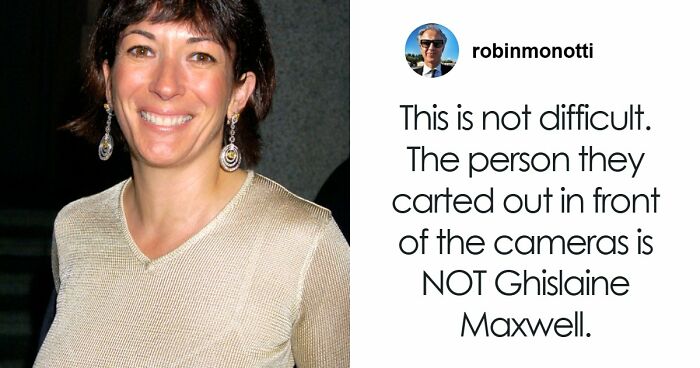

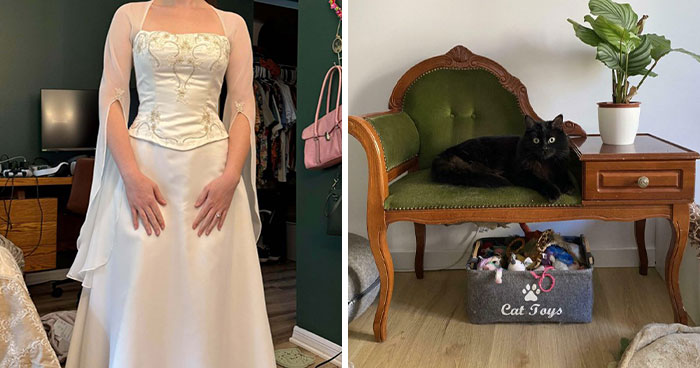










23
15